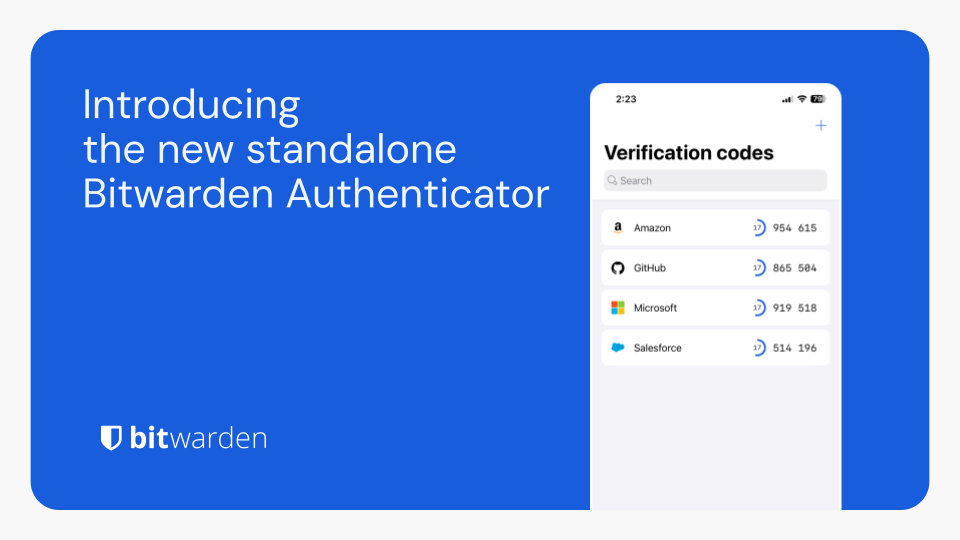- cross-posted to:
- privacyguides@lemmy.one
- cross-posted to:
- privacyguides@lemmy.one
Bitwarden Authenticator is a standalone app that is available for everyone, even non-Bitwarden customers.
In its current release, Bitwarden Authenticator generates time-based one-time passwords (TOTP) for users who want to add an extra layer of 2FA security to their logins.
There is a comprehensive roadmap planned with additional functionality.
Available for iOS and Android
with full Internet access (As shown in Aurora Store)
Thanks but I pass, I’d rather use Aegis that doesn’t need internet connection at all.
How does 2FA work without an internet connection?
it’s basically just a shared random number generator on a timer (it’s slightly smarter than that but that’s the gist), so as long as you know the start time, the current time and the starting point for the RNG, both parties can get the same result without having to ever communicate
deleted by creator
Thank goodness! I can finally get the hell away from Authy!
What’s wrong with Authy?
Not open source, and I believe an account is required.
Also doesn’t allow you to export so you can’t switch to another service
Also they have weird behind the scenes integrations into accounts even if they are just supposed to be regular 2FA. You can read stories about Twitch not playing well with other 2FA until 30 days after you remove Authy. I don’t want those kind of shadow integrations and I should be allowed to switch apps as I see fit
Uhg… Didn’t know that part. So frustrating.
And twilio, the parent company has been hacked before
I guess for me, it being closed-source and the fact that the Bitwarden password manager and now Bitwarden authenticator are open source. Truthfully, I just see how they handled the desktop version of their Authy software, giving no fucks if consumers wanted it or not, being a big red flag of what could come after. Having used Bitwarden for years now, and giving them $10 a year, makes me more biased and inclined to use their other software, since they’ve never let me down. :)
I use Aegis and it works well. FOSS and easy to use.
deleted by creator
Too many things use it, if it becomes compromised that is way too broad of an attack for me to opt into
You could have before. I moved from Authy to Aegis a few months ago
Correct me if I am wrong, but the Bitwarden client itself already does this. I store several of my TOTP’s in my self hosted Vaultwarden/Bitwarden install.
And where would you store your Bitwarden login TOTP if you used their service instead of self hosting?
And what happens if your Bitwarden account gets compromised? Now you’ve lost both factors at the same time.
No, I’ll keep my 2FA separate from my password manager, thank you very much.
Good luck getting your vault compromised.
Unless you have a weak password or the vault isn’t encrypted (which it is, AES256 iirc and you might be able to change that on a self hosted version), I don’t see that happening.
Most password manager hacks don’t attack the encryption or password themselves (my password is very long), they find/create a side channel. For example:
- keylogger attack to grab password manager password
- social engineering to reset a password
- attack the server to intercept passwords
Every secure system can be defeated, but it’s a lot less likely that two secure systems will be defeated at the same time. So I keep my passwords and second factors separate. It’s unlikely that either will be compromised, and incredibly unlikely that both will be compromised at the same time.
You’re right, it does. This is a head-scratcher.
I guess they already had the TOTP code written, so creating a standalone app was trivial, but what’s the point?
Security-wise it’s not a good idea to keep passwords and 2FA codes in the same client as it then becomes a single point of failure. A standalone authenticator app resolves that as long as it’s not unlocked with the same master password. A standalone app also opens a venue for non-BW customers to get on their platform.
It’s not a good idea to keep both on the same device, but i wouldn’t use it at all if it was a struggle
Would it count if the application is the same but all the TOTP is handled by a different database with a different passphrase?
Depends on how they got broken
TOTP in the Bitwarden Vault is a paid feature. The standalone app is free, and doesn’t even require a Bitwarden account.
This allows free tier users a way to use TOTP without upgrading, and without needing to trust Google Authenticator or something else.
TOTP code is like 5 lines. The hardest part is writing the seed to disk.
thd totp in the default application is paid and that isn’t
Because you can enable totp on your Bitwarden account and it would be dumb to store the password and totp for your biwarden vault in your vault?
Also it can act as a stepping stone for non Bitwarden customers, before getting their own vault.
Great. Now I have to make the effort of migrating from Authy.
Glad these were answered:
Isn’t this the same as storing TOTP authentication codes in Bitwarden Password Manager?
Integrated TOTP authentication is a premium feature in Bitwarden Password Manager. Bitwarden Authenticator is a standalone mobile app that generates TOTP codes for any online service that supports them. Bitwarden Authenticator can be used without a Bitwarden account.
Should I use both? When should I use the integrated authentication feature? When should I use Bitwarden Authenticator?
Integrated authentication in Bitwarden Password Manager offers a convenient way for users to add 2FA to their online accounts. This popular feature will remain available across paid plans.
Bitwarden Authenticator can be used to store your verification codes to access your Bitwarden account, as well as other online applications you use.
They can be used together, or separately, depending on your security preferences.
Does this save to my cloud account with them or is it only local? I got screwed over by Aegis (my fault) when I got a new phone and forgot to back up Aegis and lost a lot of my logins. Some of them I can’t get unless I call the company and verify it’s me 🤦🏽♂️
Do backups kids. :)
I actually keep an authenticator app on my desktop, so I always have two places for everything. Aegis on my phone and “Authenticator” on my Linux desktop.
Wait, I’m a second child, am I a backup kid?
Then how do you secure the backup without 2FA?
Or is it 2FA all the way down?
You could store it on an external drive. You can encrypt it with VeraCrypt as well.
Aegis encrypts it with a password, then you copy it somewhere. It’s just a set of keys and you can have as many copies as you want (I have three, one phone and two desktops).
Aegis doesn’t run on your desktop using the same key, it’s just a key stored there, right?
No, I use a different authenticator app (called Authenticator in the Flatpak store), but it does use the same keys. So I import the keys from an Aegis dump so I can generate exactly the same keys on my desktop app that I do on my phone.
TOTP is a really simple system, as long as I have access to the secret key and a reliable time source, I can generate the exact same tokens as any TOTP app would.
How do I do the backup for Aegis? I looked at it and it’s set up but then at the bottom it says no backups have been made 🤔
Settings > Import/Export > Export
This dumps it to a file, then it’s on you to copy it somewhere else.
Or
Settings > Backups
I think this one is automated, but I personally don’t use it, I just back it up manually when I add something new. I keep a completely functional 2FA app on my desktop, so I always have a backup in a pinch.
Thanks!
I backup everything, but Aegis
Aegis does automatic backups. I guess you didn’t turn it on?
Guess I didn’t. I hate me even more now
The penguin is dead 😂
😂 I guess it is. Damit
I spelled your username wrong. I thought the q was a g. 😂
I don’t care. It’s meant to be a penguin with a q.
Yubikey and yubico authenticator is king. Just need multiple keys. Stick it in a PC or tap it on your phones nfc… bam totp code pulls up.
Just like in the password manager, they ignored HOTP. Oh well.
Could you tell me more ?
HOTP is an HMAC-based OTP, whereas TOTP is a time-based OTP. Basically, this is how each works:
- HOTP - based on a key + a counter, which increments with each code generated
- TOTP - based on a key + time, so you get a new key every N seconds
TOTP is quite common and honestly is all I use, whereas HOTP may be more common in certain enterprises. Main criticisms:
- HOTP - longer time window for a key to be valid for the entire time between logins (i.e. potentially easier to brute force)
- TOTP - less user-friendly due to the time window; also, you just need a clock, you don’t need to know the counter value (if someone gets the key, they can generate keys whenever)
Gotcha, thank you very much.
After Authy scrapped its support for the desktop client, I’m looking for an alternative. Sadly, this does not look like it.
Sadly, this does not look like it.
Why?
I do not see a desktop client.
Ah. I only use a phone app, but I see the problem.
I use Authenticator on Linux. I’m not sure what OS you use, but perhaps there’s another, TOTP is a pretty easy protocol to implement (it’s basically just a hash of a key and timestamp).
I would like an app for desktop and phone/tablet that are syncing, just like Authy did, before they abandoned the desktop app.
So, for me that means: iOS/iPadOS and macOS
OK, so one TOTP app more. What’s this one doing better than all the others like 2FAS?
one TOTP app more
You say this as a bad thing.
Not at all, I’m just wondering if this particular one is better than any of the others.
Yeah, they’re are a few open source TOTP apps that seem pretty interchangeable. I use Authenticator Pro because it has a Wear OS integration that is handy if you have a smart watch.
deleted by creator
Nice! I currently have a couple of services on MS Authenticator that I can migrate over.
What makes you switch to this one rather than staying on MS?
Edit: oh no I asked a question that is obvious to others
MS not trustworthy
Honestly? This.
The less I have to rely on Microsoft or googie for anything, the better.
Microsoft’s Authenticator app is AWFUL. Just one example - there is a setting to backup to iCloud, but when you try to enable it, it demands you add a secondary (personal) Microsoft account.
I didn’t know it sucked on the iPhone, I haven’t had problems on Android, I actually quite like it. I would only change to get away from Microsoft
KeePassXC can do this as well. I had no idea until I saw a post on here where someone mentioned it. Here’s the documentation.
Jesus fuck. How many more authentication apps do we need that all do the same thing?
At work I need at least 4-5 different authentication apps because every customer has something different.
We don’t need another.
You only need one app, as long as the totp is implemented in a standardized way.
Microsoft products would like a chat…
I use my Microsoft account with a standard OTP app, you don’t need their own app.
Wait until your workplace requires you to only use MS Authenticator push notifications 😭 and HOTP occasionally…
Is that a thing? Usually those have a fallback to a regular TOTP code.
I use Okta for work because we integrate SSO with it everywhere, but I could technically enter a code every time and swap out the Okta app for the other TOTP app I use.
My company is a MS shop, but they use TOTP as the second factor, and even that is optional. My department uses Okta, which is a completely separate system (we’re a weird, separate unit entirely from most of the rest of the company).
I did too until it kept rejecting my tokens frequently - changing to M$ Authenticator “solved” it.
They must now require HOTP or something now. TOTP doesn’t care what machine it’s on, whereas HOTP does (well, you could spoof it if you really wanted).
They’re probably using HOTP or something else, not TOTP. TOTP is literally just the key + any clock. Or maybe it’s the “click button to authenticate” and not the “enter code to authenticate,” which might not be HOTP or TOTP, but something else entirely (e.g. Steam’s system is neither AFAIK).
If it’s TOTP, you just need to get the key and can use any authenticator app.
They did. DUO was born.
deleted by creator
4-5 TOTP apps? So far, when, e.g. Microsoft or Google have insisted use of their own Authenticator app is required, it’s worked fine for me using Ente Auth or similar just by entering the code / QR.
Yup, most 2FA is just TOTP, which is a pretty simple, open standard and is hardware independent. All you need is a key (the QR code or the numbers) and access to a reliable time source and you can make a TOTP app on anything.
I use Aegis on my phone and Authenticator on Linux (some GTK app), and they both produce identical codes for the same key.
This even works with some apps that hide the standard part - like Symantec VIP - it’s possible to extract what they are doing and use a standard TOTP app instead of VIP.
Random number generator 2fa?
Good. They make great stuff.
I personally have no use for this since I use Aegis and sync it with my synology drive
Any reason to switch from Aegis?
Thats what i want to know, i use Authy, and want to know if its worth switching for.
Honestly, TOTP is so simple it would take a lot to switch from Aegis, and most of that would be from Aegis screwing up.
Is there anything about Aegis that makes it better than Authy? Just looking at the page for Aegis, I’m not seeing a lot of difference. And it being Android only limits it.
It’s open source. Authy isn’t.
Ah, gotcha. Makes sense.
deleted by creator














